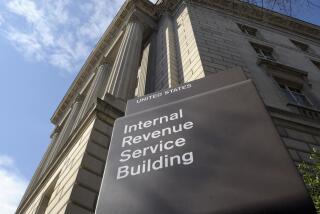YOUR TAXES : Taxes Can Be Your Friend : Little Things That Mean Big Savings
- Share via
The small business owner who keeps accurate expense records can benefit tax-wise by being aggressive and creative in taking deductions, according to small business tax experts.
For example, many business owners cheat themselves by underestimating the miles they drive for business purposes. If they kept a simple log book in the car, they might be surprised at how much more they can legitimately deduct.
“I almost always insist that my clients’ books be kept up quarterly or monthly,” said Raymond Cohen, a Northridge CPA who specializes in serving small businesses and professionals.
When a company dumps a whole year’s worth of business records on his doorstep, Cohen said, “It’s a mess and takes a whole lot of time at a very bad time of the year.”
In addition to being a headache for your accountant, “the IRS is not going to give you the benefit of the doubt,” on a deduction if your records are poor, warns Albert Ellentuck, an accountant at Laventhol & Horwath and author of its “Small Business Tax Planning Guide.”
He said it is worth spending time to organize your records throughout the year, rather than wading through piles of information at tax time. As soon as you are organized, he suggests taking time to ferret out little known, but totally legitimate, deductions.
For instance, Ellentuck said, most home-based business owners know to deduct their postage and telephone expenses and to depreciate their equipment. But they might not remember to deduct a percentage of the electric and gas bill each month.
Because the IRS may require proof that you meet with clients or customers in your home office, he suggests keeping a log book with their names, date and time of visit and purposes of the visit.
Sometimes the smallest things can add up. Ellentuck said any trade papers or magazines they buy to inform employees are deductible as an ordinary business expense.
In another area, he said small companies under pressure by employees to help with child-care expenses may not realize that the business can consider child-care assistance as a deductible business expense. Another advantage is that the money will not be included as part of the employee’s taxable income if it is less than $5,000 per year. And it doesn’t matter if the care is provided on-site or under a contract with a child-care facility.
To qualify as a non-taxable benefit, the company must explain the program in writing and offer it equally to all employees.
Ellentuck said the new, lower individual tax rates can benefit small business owners because many operate their companies as sole proprietorships, which are taxed at the individual rates.
Joseph Sonnabend, an Encino CPA, said many small business owners shortchange themselves by not keeping clear records of entertainment expenses.
“The business owner who keeps good records is always more successful,” Sonnabend said.
When entertaining customers, Sonnabend suggests using a separate business credit card. Then, right after you sign the slip, write the name of the person you are entertaining and what was discussed on the back. That way, you will never have to remember what happened on a certain date months ago.
Many small business owners rely on independent contractors to provide services ranging from word processing to plumbing repair. Sonnabend reminds small business owners that there are now penalties for failing to file 1099 forms for independent contract work. The IRS requires the form whenever you pay more than $600 to an independent contractor.
“If you don’t file the form, you are subject to a $50 fine for each form and can be liable for the tax that should have been withheld,” he said. Paul Strassels, a tax law specialist in Burke, Va., said all businesses should keep duplicate copies of financial records and important papers in case the originals are lost or destroyed by fire.
In a recent case, he said a taxpayer was denied a substantial business-related travel expense deduction because he lost his records in a move. A tax court agreed with the IRS that the reconstructed records were not good enough to support the deduction.
Sometimes the tiniest items can add up on a tax return. Strassels points out that bank fees charged against a business account are deductible, while similar fees for a personal account are not.
Small businesses dependent on purchased customer or mailing lists may be interested to know that a tax court recently ruled in favor of a businessman who had depreciated his customer list as an asset with a fixed cost and a limited, determinable useful life.
In this case, the businessman had acquired the list when he bought the business, Strassels said.
With changes in the depreciation schedules for equipment and the elimination of the investment tax credit, some tax advisers suggest that business owners consider leasing rather than buying new equipment.
Many companies that used to buy fleets of cars or trucks are now leasing them, according to Joshua High, vice president of corporate tax for Ryder System Inc.
High noted that rental and lease payments are tax deductible, while costs related to purchased equipment may only be depreciated.
In recent months, he said Ryder has purchased and leased back several truck fleets to improve the business owners’ tax positions.
More to Read
Inside the business of entertainment
The Wide Shot brings you news, analysis and insights on everything from streaming wars to production — and what it all means for the future.
You may occasionally receive promotional content from the Los Angeles Times.










